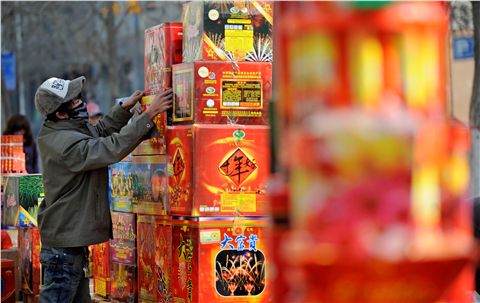Fireworks might be banned on polluted days
 0 Comment(s)
0 Comment(s) Print
Print E-mail China Daily, February 5, 2013
E-mail China Daily, February 5, 2013
 |
|
Fireworks and firecrackers can be legally sold in Beijing from Tuesday at 1,337 certified stores. [File photo] |
Many parts of central and eastern China suffered more than 20 smog days in January, the worst since 1961, according to the National Climate Center.
Beijing and its neighboring areas were hardest hit, with only five days in Beijing free from haze in January, weather authorities said.
The lack of cold air and continuous industrial emissions are the major cause of the prolonged smog, said Ma Xuekuan, chief forecaster for the National Meteorological Center.
Besides concern for air pollution, safety has also aroused call for stricter control of fireworks.
In a circular released last month, the State Administration of Work Safety called for intensified supervision of the manufacture, transport, sales, storage and use of fireworks during the Spring Festival holiday to ensure safety.
Zhang Chengdong, deputy director of Jiangsu Festivals and Events Association, said setting off fireworks during celebrations is a tradition for the Chinese that should be preserved, but illegal production poses the greatest danger to fireworks.
"There's no unified standard to regulate the manufacture of fireworks and firecrackers, so they have become more powerful year by year and pose more danger to the public," he said.
Ma at the Institute of Public and Environmental Affairs said management should be intensified in the manufacturing and distribution of fireworks.
"We always intensify inspection on the fireworks market around major holidays such as National Day and Spring Festival to ensure safety," said Bai Qiuyan, an official for Liaoning province's administration of work safety.





